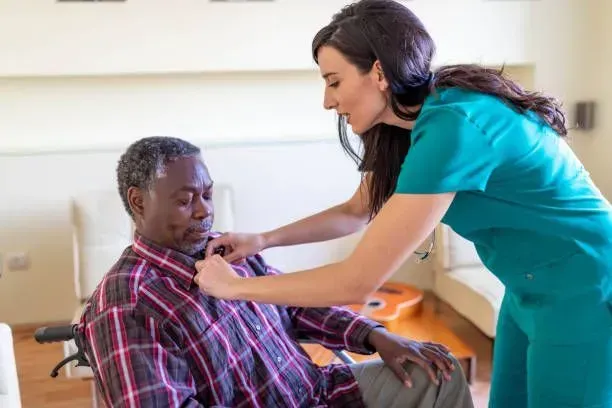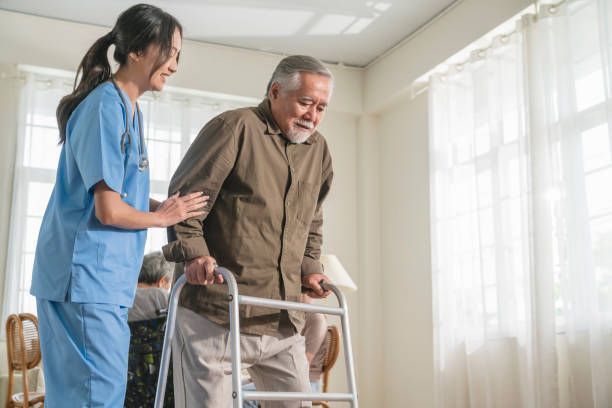How to Dress a Patient with Alzheimer's or Dementia
How to Dress a Patient with Alzheimer's or Dementia
At 7 Day Home Care, the value of experienced caregivers in Alzheimer’s and dementia care cannot be overstated, especially regarding Activities of Daily Living (ADLs) such as dressing. Experienced caregivers possess specialized skills and compassionate understanding that are essential in managing the unique challenges faced by dementia patients. They are adept at creating structured routines, simplifying tasks, and using adaptive clothing to ensure the dressing process is as stress-free and dignified as possible. Their expertise in providing clear, step-by-step instructions and offering gentle assistance helps maintain the patient's comfort and independence. Additionally, experienced caregivers are trained to recognize and address behavioral changes, reduce anxiety, and employ effective communication strategies, all of which contribute to enhancing the overall quality of life for patients and providing peace of mind for their families.

Are You Searching for a Home Care Agency Near Me
with Experience in Alzheimer's and Dementia Care Including Dressing?
Dressing a patient with dementia can be a challenging task for caregivers. Patients with dementia, including Alzheimer's disease, often experience difficulties with memory, coordination, and decision-making, making daily activities such as dressing more complex. This guide, provided by 7 Day Home Care, aims to offer practical tips and strategies for caregivers to make the dressing process smoother and more dignified for dementia patients.
Understanding Dementia and Its Impact on Activities of Daily Living
Dementia is a broad term used to describe a decline in cognitive function severe enough to interfere with daily life. Alzheimer's disease is the most common form of dementia, accounting for 60-80% of cases. Symptoms of dementia include memory loss, confusion, difficulty with language, and impaired reasoning and judgment. These symptoms can make dressing a particularly challenging activity.
Patients with dementia may struggle with recognizing clothing items, understanding the sequence of dressing, and managing fine motor skills like buttoning or zipping. They may also experience anxiety or frustration during the dressing process, which can exacerbate their cognitive difficulties.
Importance of a Calm and Supportive Environment for Dementia Care
Creating a calm and supportive environment is crucial when dressing a patient with dementia. Here are some key considerations:
1. Establish a Routine
- Consistency: Establishing a daily routine can help patients with dementia feel more secure and less anxious. Try to dress the patient at the same time each day and in the same location.
- Familiar Environment: Use the same room or area for dressing, and ensure it is free of distractions. A familiar and quiet environment can reduce confusion and agitation.
2. Minimize Choices
- Simplify Wardrobe: Reduce the number of clothing items to choose from. A simplified wardrobe with a few easy-to-wear options can prevent overwhelm.
- Pre-select Outfits: Lay out a single outfit for the patient to wear. This can help them focus and understand what they need to do.
3. Use Clear Instructions and Gentle Guidance
- Step-by-Step Directions: Break down the dressing process into small, manageable steps. Give clear, simple instructions one step at a time.
- Demonstrate Actions: Show the patient how to perform each step. Visual cues can be very helpful for individuals with dementia.
- Offer Assistance: Be ready to offer physical assistance if needed, but encourage as much independence as possible.
Practical Tips for Dressing a Patient with Dementia
1. Choose Appropriate Clothing
- Comfortable and Easy to Wear: Select clothing that is comfortable and easy to put on and take off. Avoid items with complex fastenings like buttons and zippers. Instead, choose clothes with elastic waistbands, Velcro closures, and large armholes.
- Soft Fabrics: Opt for soft, non-irritating fabrics that are gentle on the skin.
- Layering: Use layers to adjust to temperature changes. This allows for easy removal or addition of clothing without causing discomfort.
2. Adapt Clothing to the Patient's Needs
- Adaptive Clothing: Consider purchasing adaptive clothing designed specifically for individuals with disabilities. These garments often feature open-back designs, side-zip pants, and other modifications that make dressing easier.
- Footwear: Choose non-slip shoes that are easy to put on and take off. Avoid shoes with laces or buckles.
3. Create a Functional Dressing Space
- Organized and Accessible: Keep the dressing area organized and ensure all necessary items are within reach. Use labels or pictures to help the patient identify clothing items.
- Comfortable Seating: Provide a sturdy chair or bench for the patient to sit on while dressing. This can make the process safer and more comfortable.
4. Be Patient and Respectful
- Maintain Dignity: Always treat the patient with respect and maintain their dignity. Allow them to do as much as they can independently.
- Positive Reinforcement: Offer praise and encouragement throughout the dressing process. Positive reinforcement can boost the patient's confidence and cooperation.
5. Address Behavioral Challenges
- Stay Calm: If the patient becomes agitated or resistant, remain calm and patient. Take a break if necessary and try again later.
- Distraction Techniques: Use distraction techniques such as playing soft music or engaging the patient in a pleasant conversation to reduce anxiety.
Step-by-Step Dressing Guide for Dementia Patients
Step 1: Preparation
- Gather Clothing: Collect all necessary clothing items and lay them out in the order they will be put on.
- Prepare the Patient: Explain what you are going to do, using simple and clear language. Ensure the patient is in a calm and comfortable state before starting.
Step 2: Undressing
- Remove Clothing: Gently assist the patient in removing any existing clothing. Provide clear instructions and support as needed.
Step 3: Dressing the Upper Body
- Undershirt or Bra: Help the patient put on an undershirt or bra. Encourage them to assist by lifting their arms or holding the garment.
- Shirt or Blouse: Guide the patient's arms into the sleeves and pull the shirt or blouse over their head or around their back. Use adaptive clothing if necessary.
Step 4: Dressing the Lower Body
- Underwear: Assist the patient in putting on underwear. If needed, help them step into the garment and pull it up.
- Pants or Skirt: Help the patient step into pants or a skirt. If using adaptive clothing, ensure all closures are secure.
- Socks and Shoes: Guide the patient in putting on socks and shoes. Choose non-slip footwear for safety.
Step 5: Final Adjustments
- Check for Comfort: Ensure all clothing is comfortable and properly adjusted. Make any necessary adjustments to prevent discomfort or irritation.
- Positive Reinforcement: Offer praise and encouragement for the patient's cooperation and effort.
Special Considerations for Advanced Dementia
Patients with advanced dementia may require more hands-on assistance with dressing. Here are some additional tips:
1. Use Adaptive Clothing
- Adaptive clothing can be particularly beneficial for patients with severe cognitive or physical impairments. These garments are designed to simplify the dressing process and reduce the need for extensive assistance.
2. Provide Full Assistance
- Be prepared to provide full assistance with dressing, while still encouraging any level of participation the patient can manage. Use gentle, reassuring language and maintain a calm demeanor.
3. Monitor for Discomfort
- Regularly check for signs of discomfort or irritation, such as pulling at clothing or verbal expressions of discomfort. Make necessary adjustments promptly.
Dressing a patient with dementia requires patience, empathy, and practical strategies to ensure the process is smooth and respectful. By creating a calm environment, simplifying choices, using adaptive clothing, and providing clear instructions, caregivers can help patients maintain their dignity and independence as much as possible. At 7 Day Home Care, we are dedicated to providing specialized in-home Alzheimer's and dementia care, ensuring the highest quality of life for our clients. For more information and support, contact us today.
7 Day Home Care provides specialized in-home Alzheimer's and dementia care tailored to the unique needs of each patient. Our compassionate and experienced caregivers are trained to deliver high-quality care that promotes independence and dignity. Contact us at 516-408-0034 for more information about our services and how we can support you and your loved ones. 7 Day Home Care is licensed by the New York State Department of Health to provide home care services, including meal preparation in Manhattan, Queens, Brooklyn, Nassau County, and Suffolk County, New York.
Brian Callahan
7 Day Home Care


Living With Parkinson’s Disease: How In-Home Care Helps Seniors Stay Safe, Independent & Comfortable








